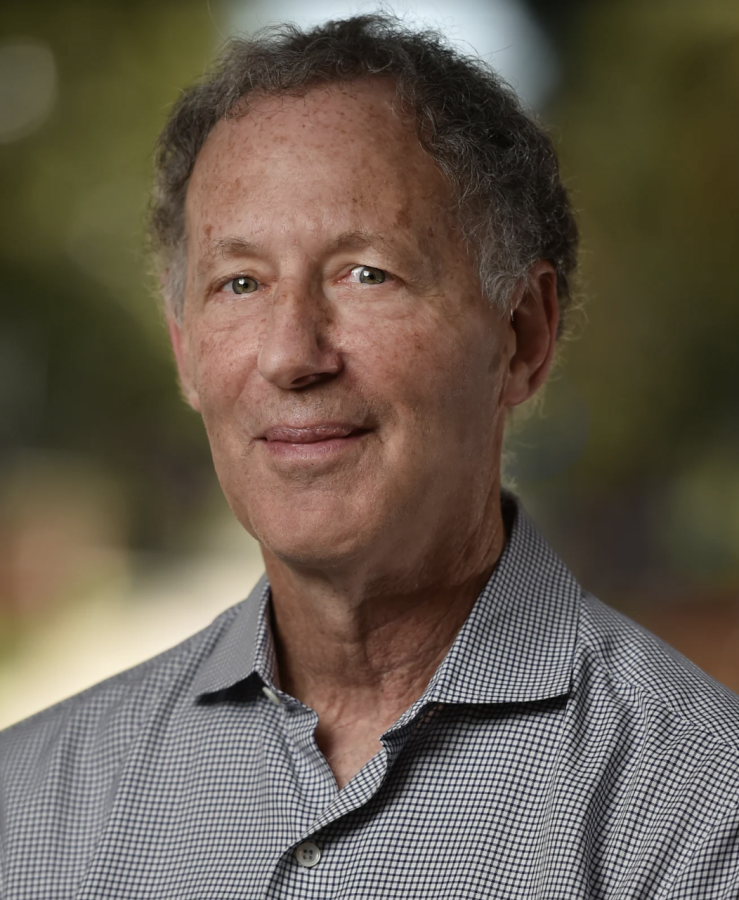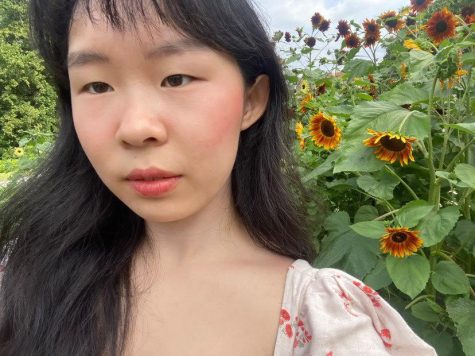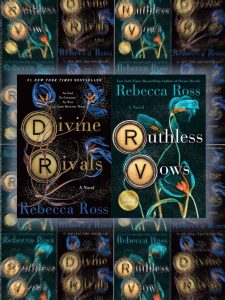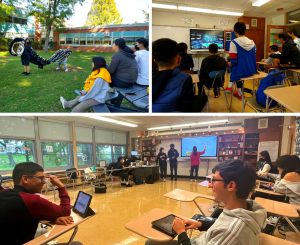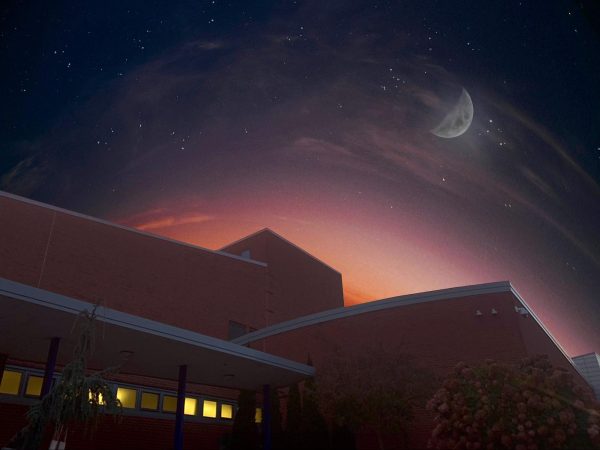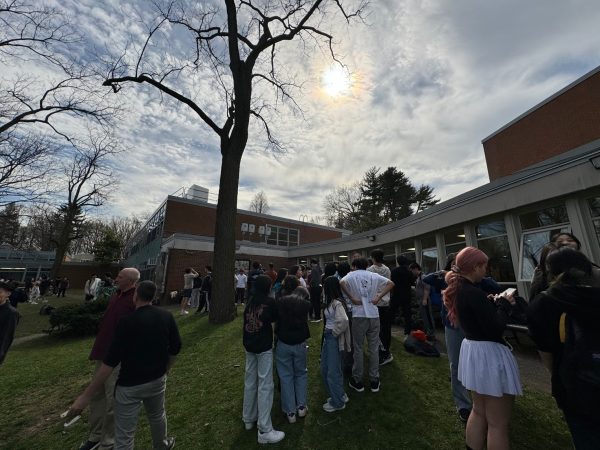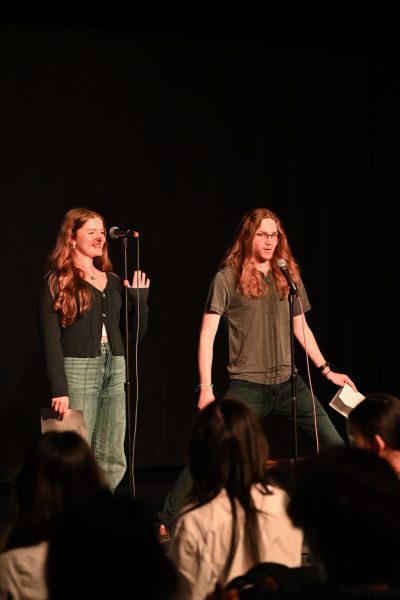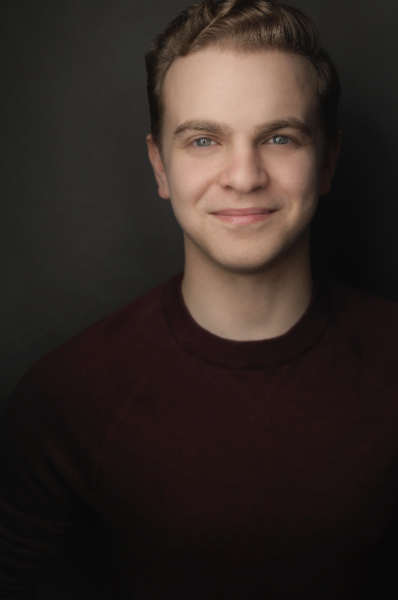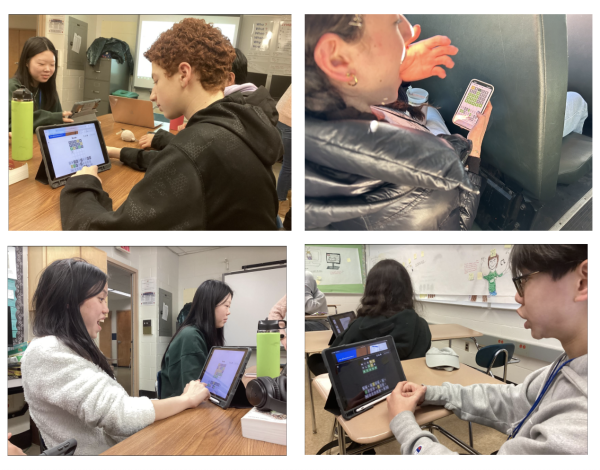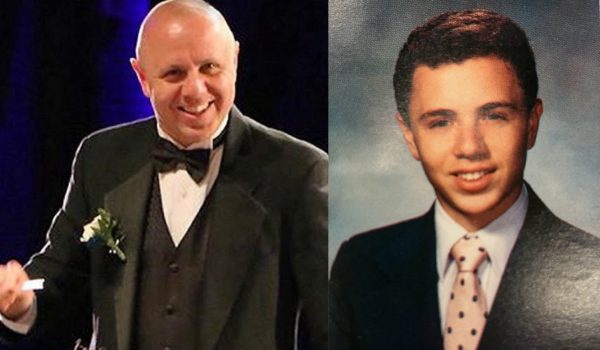Notable Alumni Interview Series #4: Mark Kelman
May 27, 2022
Mark Kelman (Class of ‘68) is a James C. Gaither Professor of Law and the Vice Dean of Stanford Law School. Throughout his career, Kelman has applied economics, cognitive psychology, and political theory to legal fields such as criminal law, taxation, administrative regulation, and disability law. Kelman is the author of seven books, most recently What Is In a Name?: Taxation and Regulation Across Constitutional Domains (Carolina Academic Press, 2019) and numerous other publications. Before joining the Stanford Law faculty in 1977, Kelman served as Director of Criminal Justice Projects at the Fund for the City of New York.
Sophia Liu: How was your time at Great Neck South High School? When did you attend? What was your most memorable experience?
Mark Kelman: I was there from 1965 and graduated in 1968, which was a fairly intense year. Most of my memories are in little flashbulb memories. I don’t think I have a really great sense of what each point in time was like, but my most interesting experience was my senior year. There was a new independence associated with it. I worked on The Southerner with my best friend. I was the Editor-in-Chief and he was the Managing Editor. We had to go off to the printer in New Hyde Park. We were allowed out of school in the middle of the day to drive over to the printer to fix or deliver things. I liked feeling less under constant surveillance.
I remember there was a controversy during my senior year over having published a poll on the legalization of marijuana and having written an editorial about it. But I actually can’t remember how it got resolved.
The second semester of my senior year was both the assassination of Dr. King and the assassination of Robert Kennedy. Those were both enormously salient events. The other thing was Dr. King had spoken at South right before his assassination. I think he was fundraising. There was some big fundraiser in Kings Point, but he gave a public address at our auditorium. I remember that The Southerner was covering it and I remember being there. He was an amazing and mesmerizing speaker. We didn’t get a famous speech, but even his regular old speeches were ridiculously mesmerizing. The speech was a mixture of a speech about anti-war and his transition from focusing on poverty in the black community to civil rights and economic and community development.
I remember moments of playing basketball as well, but I was less academically engaged. I recall college as more academically interesting.
SL: Were you at South during the 1968 busing controversy?
MK: The busing controversy happened as I left for college. There was a split in the community with people who were abstractly devoted to increased integration and then the sort of subtle silent resistance from people who don’t want to pose barriers, but they’re not acknowledging their resistance. I was a freshman in college for most of that, so I wasn’t around to see it, but my sister was still in high school. But the school was definitely not internally integrated in any reasonable sense. It was not a multicultural school. There was a small portion of African Americans, mostly living near Northern Boulevard, but otherwise, Great Neck was predominantly Eastern European, especially Italian American Catholic. The whole change of demographics towards Iranian Jews took place after I got out of high school in the late 70s.
SL: Was there a teacher at South that particularly influenced you?
MK: My physics and calculus teachers were incredible, but I’m not sure either of them had a big influence on what became of me. I was a dutiful student in high school. I did not find high school enormously engaging or interesting. I was a good boy, I did my work, and I did really well in conventional terms. But in terms of being interested, I found The Southerner and my classmates much more interesting than I found classes.
I was a little weird. My older brother was unnaturally public as a high school student. He had articles published in the New York Times and Sunday magazine by the time he was 18 or 19 and had a book published while he was in college. He was a Presidential Scholar, which meant he went to the White House. I was in comparison reserved, while he was incredibly connected academically and intellectually. I was much more interested in sports. I obviously had to do well in high school since I went to Harvard, but school wasn’t central to my identity.
SL: You mentioned playing basketball. Can you talk more about that?
MK: I love playing basketball and played into my 60s when my back and hips finally gave out. At 45, it was already ugly. The version past 60 was ludicrous. I played in loads of intramural leagues and recreational leagues, both in high school and college. I was very small through 10th grade—I just turned five feet tall, partly because I’d skipped a grade. Then, at the beginning of 10th grade, I grew about 11 inches in a year, which was not really great for my joints. I grew from being teeny to being six feet tall in about a year.
I have random memories of high school. I have an extremely strong memory of being at my best friend’s, the one who was Managing Editor of The Southerner, house after senior prom and talking with the young woman that he had gone to prom with, who was a good friend of both of ours. I was like, Did we really have to stay up and go to Jones Beach at five in the morning?
It was custom at the time to do that after prom.
I also remember the new advisor of The Southerner my senior year. I remember he placed an enormous amount of cultural and political meaning into how the paper was laid out, which meant more randomized columns and white space and not the traditional NY Times type of way. It became much harder to lay out and I couldn’t figure out why he was so set on this. I guess going to school in the late 60s involved cultural conflict, but again, we couldn’t figure out why it was so meaningful to him.
SL: After South, you attended Harvard. What was the application process like then? What did you study there?
MK: I, and I think it was custom at the time, applied to four schools. One of them was supposed to be one that you are more sure of getting into. And then the other three could be different schools. My brother was already at Harvard.
I remember my junior year during spring break, I traveled with my dad to visit a bunch of other schools. The one that I went to that I remember liking much more was Harvard. I remember being at Yale and not liking it much. But I applied there anyway.
I remember I didn’t apply to Amherst after visiting there. It felt like it had this very strong prep school vibe to me. Prep school of the 1960s was very heavily WASP-y and privileged—filled with families who may have gone back to the Mayflower and had three generations of wealthy bankers.
It was jarring to me, so I didn’t apply there. But even when I was a freshman at Harvard, the school was still about 40% prep school kids. We had roughly 60 kids in the class for Exeter, 45 from Andover, 30 from Choate. A large part of Harvard was still heavily old money. We were integrated with women in all of our classes, but Radcliffe was still separate admissions and only a quarter the size of Harvard. I think there were 1600 men to 400 women in the school.
When I got to Harvard, men still had to wear jackets and ties to all meals. That rule was suspended in November of my freshman year because of protests from African American students who wanted to wear dashiki, an African cultural form of dress. But that rule seems bizarre beyond belief.
There were several parietal rules. In my freshman year, women could only be in men’s rooms only at certain hours, which were very, very restricted. There were rules about how doors have to be kept open, at least as wide as a book. People were probably violating that rule all the time. By my sophomore year, my dorm was gender-integrated. This is late 60s garbage, which is this thin line between what is thought of as liberation and the oppression of women not being really clearly understood. We had a swimming pool in my sophomore dorm. Most people swam in the swimming pool without clothes. Men and women were swimming together unclothed twelve months after the rule that women couldn’t be in men’s rooms.
In the 12-month period when I get to college, we go from having to wear jackets and ties to all meals to nobody wearing anything but T-shirts and ripped jeans. And that’s all in a 12-month period when I get to college. There’s a lot of this sort of, some real, and some superficial social change going on. In three of the four years in college, school closes for at least some portion. In my freshman year, there’s a strike after the bombing of Cambodia which led to the burning down of a CIA-affiliated International Studies Institute at Harvard. In my junior year, my roommate and I went to Boston to see a movie, and when we came back, Harvard Square was fully occupied by police on horseback and there were fires all around.
I was also very academically engaged in college, I studied a lot of policy in both economics and history. I majored in Social Studies, which meant I took seminars studying Marx, Weber, and Freud, and then moved onto junior and senior tutorials. I did my thesis on income equality issues.
The other thing I remember about college is that many of my classmates believed, more than I did, because of all the cultural things going on, that the world was going to be really different, that their adult lives would look nothing like their parents’ lives. And I was very skeptical of that. I was always a fairly skeptical person. I had a lot of classmates who thought all of these professions like lawyer, doctor, or whatever, would barely exist in a recognizable form, or none of their classmates would end up doing anything that resembled the jobs of the 1950s and 1960s. And of course, they all did. In my Harvard Class of ‘72, virtually everyone became a lawyer or a doctor. As I began college, there’s this transition to counter conventionality and as I’m ending it, there’s this retreat to conventionality.
SL: Did you further pursue journalism?
MK: No, I wasn’t on The Crimson in college. But I wrote a novel that was published right after I got out of college. I realized that I would always be interested in writing, but it wasn’t going to be my dominant professional identity.
Getting the novel published was weird as can be. There was this guy who lived in Great Neck, who I didn’t really know, but my parents knew him a little bit. He was the editor of the Saturday Review Press. I gave him this novel that I’d written in my senior year of undergraduate and finished in the summer after. It was like, you know, a cute little 21-year-old wrote this novel.
I was working in the city in the summer after my senior year doing political consultant work for the City of New York through a foundation. I was trying to make a little bit of money so that I could live in Ithaca with the friend who had been Managing Editor of The Southerner and was now starting law school at Cornell.
I wanted to take a year off to keep writing, but I had to make some money in order to be able to do that. When I was waiting for the train, I ran into the guy, whose name I’m forgetting. And he says, “Oh, what a coincidence running into you because we were going to call you later and make an offer to publish the book.” That came completely out of nowhere. Then I was working on a different book when I was in Ithaca with my friend
I was picking between going to graduate school in economics, to do a policy side of economics or go into law. I thought I didn’t want to be an academic, but then I went to law school and ended up being an academic for the next 50 years anyway.
SL: You joined the Stanford Law School faculty in 1977, so you’ve been teaching there for forty-five years. What brought you to Stanford?
MK: When I was a third-year law student, I decided to write a paper, but I didn’t write it with the purpose of becoming an academic. It was done because I was really interested in it. It’s an over 300-page paper. That year, I went to classes and took exams, but most of all I did was work on this paper.
I didn’t think of it as instrumental. But when I was working in New York, the year after, the person who was my third-year advisor, a professor at Harvard, showed the paper to somebody who was visiting Harvard from Stanford. That person contacted me saying he really liked the paper and the paper got sent out to many people. Then I was contacted by my advisor who asked if I wanted to be in the legal academic market because the Stanford guy was really into my work.
This guy took me out to dinner at some very fancy Indian restaurant overlooking Central Park. I barely went to fancy restaurants, so this whole thing seemed really weird. I talked with him for hours on end about both the paper and the work I was doing in New York City, involving both some prison reform issues and some issues about child abuse and neglect. Then, I was invited to give a talk and interview at both Stanford and Berkeley and I got jobs at both of them. But it was really very haphazard. Now, it’s become much more bureaucratized and organized. No one would ever go to a school without reading about all the people who are going to interview them.
My paper grew out of my interests in income inequality and environmental issues. The question I was asking was if the attack on environmentalism and income inequality interferes with economic growth and whether growth was really that important.
I found that the degree to which people are well off or not depends more on if they have more things they’re used to having. Economic growth fails if people just reequilibrate to a new level of expectation. The claim is that economic growth within prosperous countries doesn’t really increase people’s sense of well-being or welfare. They just become addicted to a higher level of consumption. I did a lot of empirical research on how people save and have children. Fertility often reflects how much people think they’re well off. Turns out you can’t predict fertility at all in terms of absolute income, but you can predict it in terms of people of childbearing age relative to their adolescence. The baby boom occurs when people who had been adolescents in the Depression had become relatively well-off post-World War II. I got interested in this because during the mid-70s, when I was writing this, fertility was cratering. Absolute income is much higher during the 70s than during the baby boom, but much lower than it was in the late 60s when people then of childbearing age were adolescents. With the 1974 oil crisis and hyperinflation and stagflation, the birth rate craters even though the absolute income was higher during the baby boom. People tend to save not when they’re well-off, but when their absolute income is relatively high compared to their expectations.
I did this not because I wanted a job in the academic world, but because I was interested in these issues I could never work with again. It got me my job.
SL: What has kept you at Stanford?
MK: We have wonderful students, many of whom are really interested and interesting and will go on to do interesting things. The school has always been promotive and tolerant of a wide range of work. It doesn’t have a narrow canon of legal work. It’s given me the opportunity to pursue an incredibly wide range of interests from working with grad students to run psychology experiments to working to interview special educators in Mississippi and Alabama about their implementation of special education programs. For that project, I actually did interviews in Great Neck. The last time I was at Great Neck South was around 1995 interviewing people about how rich and privileged districts implement special education law.
In Mississippi, we did research on how under-resourced districts, which have massive educational needs, interpret special education law and how prosperous districts do. I’ve been able to do some straight legal doctrinal stuff, much more political theoretical stuff, law and psychology, and law and economics.
The school has encouraged and supported a wide range of things. Things interest me when I hear other people believing in things that don’t sound right to me. Then there’s different ways to pursue my interests. And California is great.
SL: You’ve taught first-year courses in Property and Criminal Law for decades. What is it like teaching the same courses for an extended period of time? Has your approach to teaching these courses changed over the years?
MK: Teaching is different from working through an issue. It would be repetitive if what you’re trying to get out of it is trying to get new stuff out of Criminal Law or Property that I teach.
In fact, in general, if it feels new to me, it’s probably too tricky to raise to first-year students. I think that our student body has made teaching more interesting. The student body when I got there was not diverse. The first set of classes I taught in the late 70s were probably 80% white and 80% male, of each. So the presence of people with different experiences and perspectives started increasing steadily in the late 80s and proceeded at pace. You get to elicit a wider range of reactions in class. That’s not really me teaching, but rather the environment in which I teach.
There’s little changes I’ve made through the years, such as switching from cold calling to panel, so students know when to prepare and are less stressed. But there hasn’t been any major pedagogical change.
I have, unlike my younger colleagues, not adopted PowerPoints. I’m not a PowerPoint person, and I’m sure some of my students are disappointed. There’s an age division with the faculty on PowerPoint use. I find that I get mesmerized by the Powerpoint and don’t listen to the presenter, so I think I improperly project that onto my students.
SL: You’re regarded as one of the founders of critical legal studies. Was it daunting to write A Guide to Critical Legal Studies since it was one of the first books synthesizing the subject?
MK: I taught the course as a seminar a couple of times before I wrote the book, so I wanted to make it more accessible to interested students. I started getting invited to other law schools to speak about critical legal studies and I really hated doing that. I think I wrote the book so I would never have to do it again.
You really have to think much much harder when you teach. You have to help students work through it. So I really never thought if there was a core to this subject, but when you have twelve classes to teach, and you have to find readings and how to comment on the readings and what questions to ask about the readings, it does force you to think.
In the last few years at Stanford, and I may write a book about this, I started a new class called Behind the Doctrinal Curtain. You take courses in all these fields; criminal law, contracts, property, bankruptcy, antitrust, etc. and each of those subgenres has its own set of materials. I had the thought that there are recurring issues that show up in all these courses, such as how to administer legal issues, how to infer causation, etc.
There are texts that everyone associates with critical legal studies. By thinking and teaching, will I recognize some themes that will help students make sense of all of these topics? That’s the question I wanted to answer with the book.
SL: You were elected as a member of the American Academy of Arts and Sciences in 2008. Has the Academy helped advance your work?
MK: I’m not that connected to it. It was more like receiving an honor. It was nice because I was elected right before my father died. It was a happier moment for him than for me.
SL: You’ve been consistently writing, researching, and teaching for almost half a century now. What would you want your legacy in academia to be?
MK: I’d like to think that I did work that was persuasive and thought-provoking on issues of political consequence, particularly on issues related to equality and responsibility towards the environment. I would hope that I contributed to approaches on debates that were not always intuitive to people. I also, and I think this has become more important to me in the past decade, would like to think I pressed people to be self-critical even when they agreed with me on bottom-line things—to make people understand that there are both orthodox and heterodox ways of thinking about issues where there is a reflexive reaction. People tend to think, If I find myself politically progressive, I should think x. I wanted to press people to think well, maybe “x” is the answer you want to adopt uncritically. My role in the first 25 years of my career was mostly pressing against the growing neoconservatism that started in the 1980s with Reagan and has somewhat continued today, though I think the ethnonationalism in the Trump era is distinct in certain ways. It’s worse—more antidemocratic, more racist.
I actually, weirdly, as unbelievably upsetting this new version of the political right is, I don’t think my academic work can do anything to counter it. I think the academic skills I have armed people to resist the earlier forms of anti-egalitarianism and anti-environmental regulation. In the 21st century, to a greater degree, my academic skills greater serve to caution people whom I by and large agree with on the left to be more self-critical and to recognize non-orthodox ways of the positions they take. My career is oddly divided.
I feel terrible for people in my children’s generation and your generation. I feel we’re in a really, really, really bad mess of a world. And I don’t know what’s going to stop that. It’s stressing to me that academic skills can’t stand in the way of the ethnonationalism and anxiety over the weakening of the traditional patriarchal family, which is driving the Trump movement. I don’t think there’s an academic answer. I don’t think anything I understand can counter that.
SL: What advice would you give to high school students or anyone in the process of figuring out themselves and their future?
MK: I would give two pieces of advice other than don’t listen to older people’s advice. First: don’t confuse the person that would be acceptable to others with who you are. Be honest in your interrogation with your likes, dislikes, and beliefs. Don’t fool yourself into becoming a more convenient person. Second: don’t be strategic too often. Work on things that matter to you and that will work out to your ambitious benefit. Sometimes it won’t work out, but your life will be much better if you spend your time on things you care about and believe in.
There’s also two confessions from Catholicism that I like: the sin of presumption and the sin of despair. The sin of presumption is presuming that no matter what you do, you will earn God’s grace. The sin of despair is believing nothing you can do will earn God’s grace. There’s a secular equivalent to them—you should never think that everything is going to work out no matter what you do nor think there’s nothing you can do to make your life how you would want it. You should neither be in despair that you’re powerless nor should you believe everything should be handed to you. Don’t fall prey to the sin of presumption or despair.
SL: What are you working on now? What can we expect in the future?
MK: I’m working on a book called Injuries that attempts to give a general political theoretical account of what it means to be harmed or hurt and examine why a series of things, such as poverty, sexual harassment, discrimination, and death that are deemed intuitively injurious are actually injurious. Death is a complicated injury because once you’re dead, you don’t experience injury. I’m pretty far along and hope to finish by summer.
I still write fiction. In addition to writing novels, I’ve written some screenplays and teleplays. Now, I’m working with my younger son on a teleplay.
I have a grandchild now, and I spend a lot of time with him.
SL: Thank you so much for speaking with me. It’s been a pleasure to hear about your experiences. Is there anything else you’d like to share?
MK: The biggest thing I feel now with age is trepidation about the future, about my children’s, grandchildren’s, and your generation. I wish I had a better idea of what role I could play in working with others in bending us away from the bad path of history.

